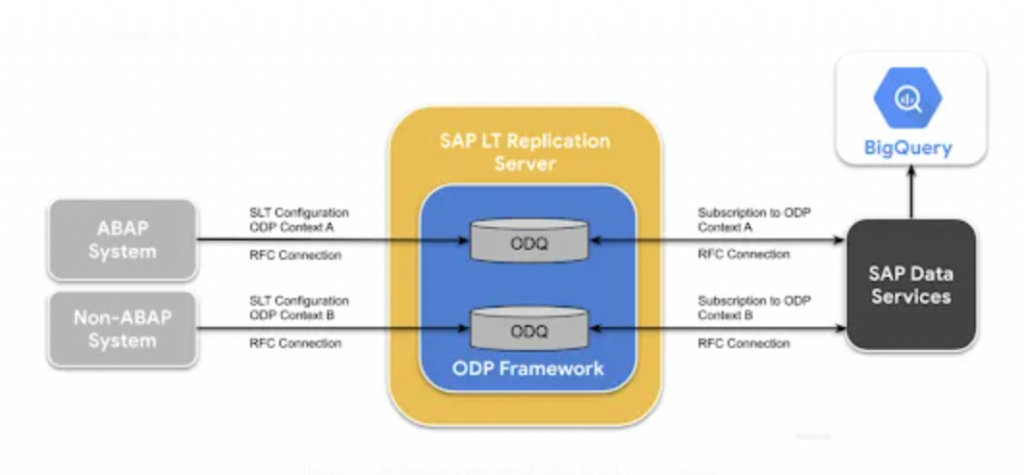In 2021, Google is still dominating search results. Just this year, the popular search engine has already received more than 360 billion inquiries. If you want your business to be discovered by customers, you need to optimize your website for Google. Of course, this is easier said than done.
If you are interested in practical data analytics approaches for SAP data, These following points show possibilities of loading data from SAP to Google Services:
- Extracting data via RFC (Remote Function Call) interface with data integration tools like talend/Google Dataflow/etc.
- Using a SAP Replication Server
- 3rd party connectors like Fivetran
- Writing an ABAP program
A possible solution can be like this:

Today, we’re going to see how you can boost your SEO strategy.
Why Big Data Matters to SEO
As all of us know, SEO takes time. From creating content to getting high-quality backlinks, ranking your website on the first page of Google won’t happen overnight. That’s why so many people jump ship too early before seeing any results. However, there are certain things that can speed things up significantly.
Big data is being used throughout marketing, including SEO. Using big data in your SEO strategy will help you be proactive instead of reactive to changes that are happening on SERPs. Social analytics can now be used to measure the health of your website’s organic social signals and guide your future efforts.
- Detailed Analysis Of Your Social Analytics Data
The main goal for having access to big data is to understand better what works! Of course, you don’t want to try something if it has already been proven not to work for you or others. But, on the other hand, understanding what does work will allow you to focus your efforts where they are most profitable – with demonstrable results.
- Identify Opportunities For Improvement & Taking Action
You may have a hard time understanding where to start in creating an SEO strategy. Luckily, if you have active social media accounts, you have enough data to get an idea. See what resonates with your users. You can use your social data to analyze what you are doing well and where you could improve.
- Analyze The Competition
There is nothing wrong with looking at the competition, especially since they’re probably already doing it! However, what works for them may not work for you because every business is different in some way. Understanding how they are working their SEO will allow you to determine if it’s worth trying or not using your own analysis before taking action on these findings.
- Monitor Brand Sentiment & Reputation Management
One of the best ways to make sure your brand stays positive is by monitoring what people are saying about your company! Instead of responding emotionally when someone says something wrong about your business, stay calm and focus on how you can influence the conversation to be more positive.
- Identify Opportunities To Improve Organic Visibility
You may have a hard time understanding where to start in creating an SEO strategy. You can use your social analytics data to analyze what you are doing well and where you could improve. Look for trends!
- Track Your Competitors & How They Rank In SERPs
Sometimes it’s best to leave the competition alone if they’re already doing something that isn’t working or when they’re ranking above you because there must be a reason why. However, if your competitors aren’t ranking at all, then this would be an excellent opportunity for you! Use their presence in SERPs as research on what works and doesn’t work.
- Measure Your Social Media ROI
One of the best things you can do with social media is measure your investment return (ROI). This way, you can determine if your efforts are worth it or not. This will help you better understand how to improve upon your current efforts so that you can maximize your return!
- Compare Changes In Organic Traffic To Social Activity
Comparing the changes in organic traffic to your social activity will allow you to see if they’re working together or against each other. If there is a strong correlation between them, then this is very good for you! You will be able to start prioritizing certain kinds of social media based on your SEO efforts.
- Compare Changes in Social Media With Top Ranking Pages
This is just like comparing changes in organic traffic to social activity. You’ll want to compare these two points of data in order to see if there’s a correlation between changes that happen with your social media and the pages that rank well organically. If their trends stay closely together, then this would work for you! The same thing applies here: you will be able to start prioritizing certain kinds of social media based on your SEO efforts.
- Identify Keyword Opportunities & New Content Ideas
Lastly, you need to think about the future. That means you need to be constantly looking for new ideas and opportunities. You can analyze your social analytics data to find new ways to improve existing content or identify keywords you should prioritize for upcoming content.
In Conclusion
Using your social media analytics data to guide your SEO performance will help you generate more revenue from the efforts you’re putting into online marketing. So find a way to incorporate it into your current strategy and start seeing an increase in organic visibility on SERPs!










